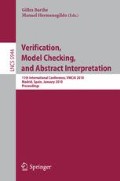Abstract
We present a loop property generation method for loops iterating over multi-dimensional arrays. When used on matrices, our method is able to infer their shapes (also called types), such as upper-triangular, diagonal, etc. To generate loop properties, we first transform a nested loop iterating over a multi-dimensional array into an equivalent collection of unnested loops. Then, we infer quantified loop invariants for each unnested loop using a generalization of a recurrence-based invariant generation technique. These loop invariants give us conditions on matrices from which we can derive matrix types automatically using theorem provers. Invariant generation is implemented in the software package Aligator and types are derived by theorem provers and SMT solvers, including Vampire and Z3. When run on the Java matrix package JAMA, our tool was able to infer automatically all matrix types describing the matrix shapes guaranteed by JAMA’s API.
The results presented here were obtained while the first three authors were at EPFL, Switzerland. The research was supported by the Swiss NSF.
Access this chapter
Tax calculation will be finalised at checkout
Purchases are for personal use only
Preview
Unable to display preview. Download preview PDF.
References
Beyer, D., Henzinger, T., Majumdar, R., Rybalchenko, A.: Invariant Synthesis for Combined Theories. In: Cook, B., Podelski, A. (eds.) VMCAI 2007. LNCS, vol. 4349, pp. 346–362. Springer, Heidelberg (2007)
Birkeland, B.: Calculus and Algebra with MathCad 2000. Haeftad. Studentlitteratur (2000)
Buchberger, B.: An Algorithm for Finding the Basis Elements of the Residue Class Ring of a Zero Dimensional Polynomial Ideal. J. of Symbolic Computation 41(3-4), 475–511 (2006)
Danaila, I., Joly, P., Kaber, S.M., Postel, M.: An Introduction to Scientific Computing: Twelve Computational Projects Solved with MATLAB. Springer, Heidelberg (2007)
de Moura, L., Bjorner, N.: Z3: An Efficient SMT Solver. In: Ramakrishnan, C.R., Rehof, J. (eds.) TACAS 2008. LNCS, vol. 4963, pp. 337–340. Springer, Heidelberg (2008)
Denney, E., Fischer, B.: A Generic Annotation Inference Algorithm for the Safety Certification of Automatically Generated Code. In: GPCE, pp. 121–130 (2006)
Dijkstra, E.W.: Guarded Commands, Nondeterminacy and Formal Derivation of Programs. Communications of the ACM 18(8), 453–457 (1975)
Flanagan, C., Qadeer, S.: Predicate Abstraction for Software Verification. In: Proc. of POPL, pp. 191–202 (2002)
Golub, G.H., van Loan, C.F.: Matrix Computations. Johns Hopkins Univ. Press (1996)
Gopan, D., Reps, T.W., Sagiv, M.: A Framework for Numeric Analysis of Array Operations. In: Proc. of POPL, pp. 338–350 (2005)
Gulwani, S., McCloskey, B., Tiwari, A.: Lifting Abstract Interpreters to Quantified Logical Domains. In: Proc. of POPL, pp. 235–246 (2008)
Halbwachs, N., Peron, M.: Discovering Properties about Arrays in Simple Programs. In: Proc. of PLDI, pp. 339–348 (2008)
Hicklin, J., Moler, C., Webb, P., Boisvert, R.F., Miller, B., Pozo, R., Remington, K.: JAMA: A Java Matrix Package (2005), http://math.nist.gov/javanumerics/jama/
Jhala, R., McMillan, K.L.: Array Abstractions from Proofs. In: Damm, W., Hermanns, H. (eds.) CAV 2007. LNCS, vol. 4590, pp. 193–206. Springer, Heidelberg (2007)
Korovin, K.: iProver - An Instantiation-based Theorem Prover for First-order Logic. In: Proc. of IJCAR, pp. 292–298 (2009)
Korovin, K., Voronkov, A.: Integrating Linear Arithmetic into Superposition Calculus. In: Duparc, J., Henzinger, T.A. (eds.) CSL 2007. LNCS, vol. 4646, pp. 223–237. Springer, Heidelberg (2007)
Kovacs, L.: Aligator: A Mathematica Package for Invariant Generation. In: Armando, A., Baumgartner, P., Dowek, G. (eds.) IJCAR 2008. LNCS (LNAI), vol. 5195, pp. 275–282. Springer, Heidelberg (2008)
Kovacs, L.: Reasoning Algebraically About P-Solvable Loops. In: Ramakrishnan, C.R., Rehof, J. (eds.) TACAS 2008. LNCS, vol. 4963, pp. 249–264. Springer, Heidelberg (2008)
Kovacs, L., Voronkov, A.: Finding Loop Invariants for Programs over Arrays Using a Theorem Prover. In: Chechik, M., Wirsing, M. (eds.) FASE 2009. LNCS, vol. 5503, pp. 470–485. Springer, Heidelberg (2009)
Kuncak, V., Rinard, M.: An overview of the Jahob analysis system: Project goals and current status. In: NSF Next Generation Software Workshop (2006)
McMillan, K.L.: Quantified Invariant Generation Using an Interpolating Saturation Prover. In: Ramakrishnan, C.R., Rehof, J. (eds.) TACAS 2008. LNCS, vol. 4963, pp. 413–427. Springer, Heidelberg (2008)
Müller-Olm, M., Seidl, H.: Computing Polynomial Program Invariants. Indormation Processing Letters 91(5), 233–244 (2004)
Riazanov, A., Voronkov, A.: The Design and Implementation of Vampire. AI Communications 15(2-3), 91–110 (2002)
Rodriguez-Carbonell, E., Kapur, D.: Generating All Polynomial Invariants in Simple Loops. J. of Symbolic Computation 42(4), 443–476 (2007)
Sankaranaryanan, S., Sipma, H.B., Manna, Z.: Non-Linear Loop Invariant Generation using Gröbner Bases. In: Proc. of POPL, pp. 318–329 (2004)
Schulz, S.: E — a brainiac theorem prover. AI Communications 15(2-3), 111–126 (2002)
Srivastava, S., Gulwani, S.: Program Verification using Templates over Predicate Abstraction. In: Proc. of PLDI, pp. 223–234 (2009)
Stewart, G.W.: JAMPACK: A Java Package For Matrix Computations, http://www.mathematik.hu-berlin.de/~lamour/software/JAVA/Jampack/
Sutcliffe, G.: The TPTP Problem Library and Associated Infrastructure. The FOF and CNF Parts, v3.5.0. J. of Automated Reasoning (to appear, 2009)
Wolfram, S.: The Mathematica Book. Version 5.0. Wolfram Media (2003)
Author information
Authors and Affiliations
Editor information
Editors and Affiliations
Rights and permissions
Copyright information
© 2010 Springer-Verlag Berlin Heidelberg
About this paper
Cite this paper
Henzinger, T.A., Hottelier, T., Kovács, L., Voronkov, A. (2010). Invariant and Type Inference for Matrices. In: Barthe, G., Hermenegildo, M. (eds) Verification, Model Checking, and Abstract Interpretation. VMCAI 2010. Lecture Notes in Computer Science, vol 5944. Springer, Berlin, Heidelberg. https://doi.org/10.1007/978-3-642-11319-2_14
Download citation
DOI: https://doi.org/10.1007/978-3-642-11319-2_14
Publisher Name: Springer, Berlin, Heidelberg
Print ISBN: 978-3-642-11318-5
Online ISBN: 978-3-642-11319-2
eBook Packages: Computer ScienceComputer Science (R0)

